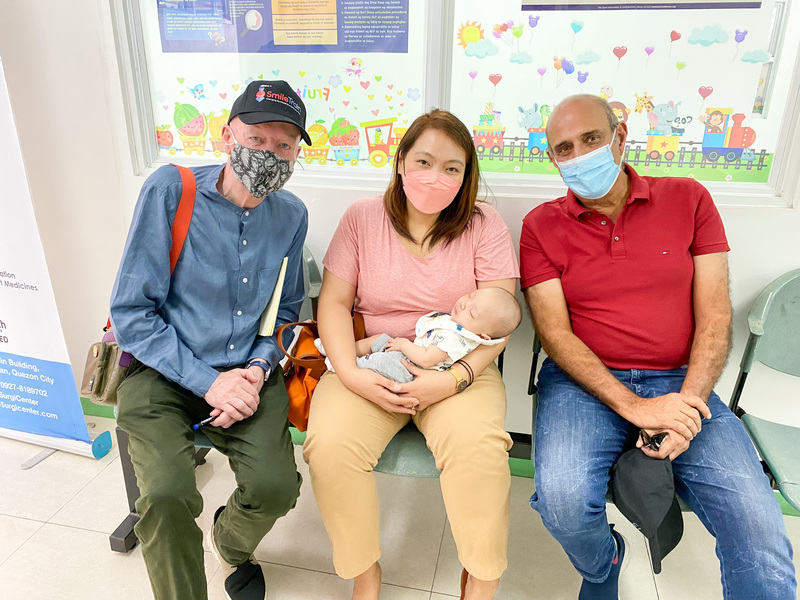Latest posts by Martin Moodie (see all)
Last Friday I spent several hours walking the splendid luxury-filled surrounds of City of Dreams in Macau, a temple of high-end shopping.
Just four days later I have returned from a rather more humble institution called the Philippine Band of Mercy, a Manila-based partner hospital of Smile Train, the international charity dedicated to treating cleft lips and palates worldwide.
There’s nothing luxury here but the (mostly young) patients inside are about to receive, or have already received, a gift more priceless than any shopping emporium can offer. A smile.


Smile Train is a remarkable organisation, one which I have been honoured to work with with for many of my 21 years with The Moodie Davitt Report. It is also the beneficiary of our ‘Smile Raising’ Charity Dinner in Singapore on 6 May.
That’s the prime reason for my visit this week. I have visited Smile Train clinics before (in India) and I am always moved by the courage of the children and their parents and the dedication and humility of the medical teams.

Clefts are a particular problem in the Philippines, where some 5,000 babies are born each year with the condition in various forms and levels of severity. Smile Train has provided 50,000+ free cleft surgeries in the country since 2001.
The organisation has trained over 100 cleft surgeons, ensuring that the country is now an epicentre of high-quality cleft care and treatment. Smile Train partners with over 200 hospitals throughout the Philippines to provide free cleft surgeries to families who in most cases simply could otherwise not afford them.
Much to humankind’s shame, many cleft children around the world are never treated, partly because of poverty, partly because of ostracization by society and partly because of a simple lack of awareness that the condition is treatable.
Many children with untreated cleft lips and/or palates are unable to eat or speak properly. They are often unable to attend school or hold a job later in life. Children with clefts are frequently isolated, bullied and shamed. Many are disowned by their families.
The Smile Train model (‘Teach a man how to fish’) empowers hospitals and local surgical teams to provide free cleft repair surgeries and comprehensive cleft care in their own communities. This is not a flying doctor approach but a model that is equally as focused on aftercare as it is on relatively simple surgery involved in changing a life.
Smile Train advances a sustainable solution and a scalable global health model. The cleft treatment drastically improves patients’ lives, including their ability to eat, breathe, speak and ultimately thrive.
I was accompanied to the Smile Train clinic by Sunil Tuli, Group CEO of King Power Group Hong Kong and a strong champion of the charity (he has kindly reserved a table at our dinner). As reported, Sunil has just returned from a visit to B&B Hospital, a Smile Train partner in Kathmandu, Nepal. There he and his wife Shikha met Smile Train Area Director – South Asia Renu Mehta, together with the local medical team, patients and their parents.


That trip inspired him to take his support to new levels (more of that in coming weeks) and to join my visit to Philippine Band of Mercy.
There we met Smile Train Philippines Program Director Felix Grimares Jr and Smile Train Communications Manager for Southeast Asia Vaninna Davidon. They in turn introduced us to Philippine Band of Mercy Medical Director Dr. Hector M. Santos Jr; Executive Director Percy Benedicto; and Program Coordinator Jaezel Feliciano.
Each of the Band of Mercy team is passionate about their work and highly skilled at it. Dr. Santos took us through the procedures involved from relatively straightforward cleft lip surgery to the more complex procedures involved with cleft palates. The younger the patient is when operated on, the easier the procedure.
The Philippine Band of Mercy unit conducts the highest number of cleft surgeries of any Smile Train globally. Despite its modest surrounds it is a place of wonder. The unit here also conducts outreach programmes all around the vast Philippines nation.


One of the many challenges Smile Train must overcome is the perception in some quarters that cleft procedures are an elective (i.e. cosmetic) surgery. “It is not, clefts can be life-threatening,” Jaezel told us. And always life-ruining. For the patient and their family.
Besides the surgery (sometimes multiple), Smile Train funds comprehensive care across areas such as speech therapy, orthodontics and more.

Pre-COVID, the Philippine Band of Mercy performed some 5,000 surgeries a year. Through the pandemic that dropped to just 1,800, meaning there is a huge backlog of kids who continue to suffer mentally and physically until they are treated. And more babies with clefts are born every day.
Kids start school at seven. “If you enter school with a cleft palate you will get bullied and shamed,” says Jaezel.
And here’s the thing. Cleft lip surgery takes just 30 minutes or so for a skilled plastic surgeon. For a cleft palate it’s around 45 minutes. Given that comparative simplicity of treatment, for children to grow up with an untreated cleft is an unacceptable stain on humanity. “A cleft is not a hopeless condition,” says Felix. “Once it’s done you can barely notice it.”
To underline that fact we met little Emilio, a bonny wee boy of just three months old who was operated on a few weeks back. Apart from a small, still-healing wound, you would not know Emilio had suffered any kind of severe defect.
The unbounded love of his Mum and Dad Cheres and George; the Smile Train funding; and the care, skill and dedication of the Philippine Band of Mercy team have ensured that little Emilio will have the normal, happy upbringing that every child deserves.


Felix’s eyes water as I tell him about our fundraiser. “I’m sorry, every time someone helps us I get emotional because I know what it does for the kids,” he says. No apology needed. I do too.
Adds Vaninna, “Please tell people you know exactly where your money is going with Smile Train. Here you give it and you change the life of that patient.”
Our short tour bears out that claim time and again. We meet little Jiana (‘God is gracious’) daughter of Joanna-Marie. Jiana had a bad cleft condition but now has a beautiful smile that breaks out spontaneously as we wave goodbye to her. It is my favourite moment of a special day.


Sunil and I talk to Clare (pictured below), eight years of age, a gentle, brave young girl who can now go confidently into the world thanks to the miraculous transformation cleft surgery has done for her.

What price a smile? A normal smile? Please support our Charity Ball on 6 May so that more Emilios, more Jianas, and more Clares can light up the world with their own.


Can you please publish where to donate ?